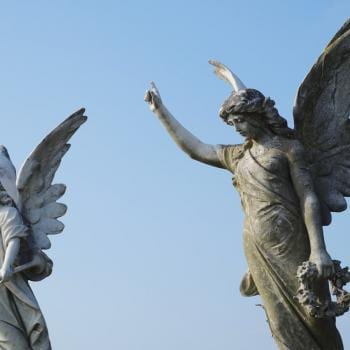It’s never easy to categorize paganism because it is, by its very nature, amorphous, subjective and lacking any central doctrinal or moral authority. Paganism in the ancient world was syncretistic and free flowing, gathering up various streams of spirituality, philosophy and devotional and ritualistic practices.
It is the same today. In fact, one could observe that paganism, with its undefined borders and subjective syncretism, is the understandable form of religion for our post modern age, just as it was in ancient Rome. In fact the similarities multiply once you begin to press them. The world of the Roman Empire was similarly diffuse with rapid mobility, movement of peoples and trade and therefore a cross pollination of culture, religious beliefs, philosophies and languages.
The simplest way to understand paganism is to realize that it has nothing to do with morality. The link between morality and religion is a Hebrew inspiration. Pagans may be “good” or they may be “bad”. They may regard themselves as “beyond good and evil.” In fact paganism has nothing intrinsically to do with morality. Instead paganism is a religious practice or belief that has to do with an interchange with the spiritual realm either to win favors in this life or to gain favors in the afterlife. Pagans try to please the gods or appease the gods depending on their perspective. They may not try to please gods as such and are only trying to please or appease “fate” or “their karma” or “the Force.”
We should not underestimate the power of paganism in the modern world today. There are very many pagans–people who have some sort of vague belief in a power of some kind and they hope for the best and may even take part in various religious practices believing that they will have a better life or a better afterlife or health or welfare or good luck of some kind. They may not define as pagans. Most do not. However, they are pagans in all but name.
With the present Synod in Rome on the Amazon it is worth outlining some other more specific forms of paganism. Pantheism is the idea that the natural world and God are the same. There is no God outside the cosmos. The natural universe is coterminous with God or at best the created universe is the “incarnation of God.” Panentheism is slightly different. Panentheism is the belief that there is a God greater than the cosmos, but that he inhabits the cosmos. God is not nature. Instead God is IN nature.
Animism is a more primitive understanding of pantheism. Most of the religions of indigenous peoples in the Amazon (and elsewhere) are animist. The animist doesn’t so much believe that Nature is God or that God is in Nature. Instead he believes that the different natural objects and creatures are indwelt by various different spirits. There are spirits of the trees, spirits of the waters, spirits of each different animal. The animist lives in a relationship with these different spirits. His religion usually consists of a highly developed mythology and series of rituals to appease and please these spirits–usually because his survival and thriving depends on it.
Polytheism is the natural outgrowth of animism. Animism is the primitive form of polytheism. In polytheism the gods and goddesses of nature become separated from their individual mountains, trees, rivers and animals. They become gods and goddesses on their own right, and demand worship and appeasement not so much as the god of that particular body of water (let’s say) but Poseidon becomes the god of the sea in a more general way. In polytheism the myths and rituals or religion–the way to understand and appease these gods becomes even more ornate and elaborate.
What is the Catholic response? When involved in any ecumenical or inter faith dialogue the Catholic response is always to ascertain what is good, beautiful and true in a particular belief, but also to go on and show how Catholicism accepts what is good, beautiful and true and also corrects what is in error.
What is good about polytheism? Only the recognition that there are many spiritual beings out there. The spiritual writers understand them to be demigods–dark angels that inhabit the spiritual realm and demand man’s allegiance. In many ways and in many forms they possessed the bodies and souls of humanity for many ages.
What is good about animism? It is good to recognize the spiritual dimension of all living things, but we reject the idea that every living thing has its own inhabiting spirit. Whenever confronted with this religion in the past the Catholic Church has discerned that these various “nature spirits” are, in fact, demonic earth bound spirits. They are to be cast out and the creation reclaimed for Christ the King. St Paul says this when he writes that “all creation groans for redemption.” (Romans 8:19-23)
What is good about panentheism? The recognition that there is a God who is the Creator and is above and beyond his own creation. We also recognized that, in a way, he is in all of his creation for it is in and by the Word–the second person of the Trinity, that all things were created and it is by him that all things live and move and have their being. (Col.1:16-17) St Thomas Aquinas taught that it was the force of Divine Love that held together not only the whole created order, but it was also the binding power within the Trinity itself.
What is good about pantheism? Not much really, except the idea that nature is sacred –not because it is God, but because it was created by God and reveals the Creator God to us because we can see and know the work of his hands.
So we may discern some good things in these various religions, but we mustn’t fall into the foolish trap of indifferentism or syncretism. Indifferentism is the naive and sentimental notion that all religions are really pretty much the same and are of the same value. You know the corny old saw, “We’re all climbing the same mountain, just by different paths”? Well that’s just silly. For anyone who thinks it through at all there are clearly some religions that are nobler, purer and more sublime than others. The theology and prayers of Thomas Aquinas cannot really compare to sacrificing a chicken to the spirit of the mango tree. The architecture of Chartres hardly compares to the squalid cave of Kali. The ten commandments and the Beatitudes are not really on the same level as the pagan haruspex fortelling your fate by examining the intestines of a goat.
As we are called to “listen to the people” who practice these other religions we should do so with an open mind, but also with a discerning spirit. We should avoid sentimentality and naivety and our seeking of understanding should not be devoid of proper criticism, discernment and astute analysis.
Image Mario Rodriguez at Unsplash












